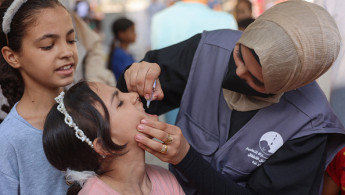Second round of Gaza polio vaccination 'more complicated': UN
A campaign starting next week to give hundreds of thousands of children in war-stricken Gaza the necessary second dose of polio vaccine will be "more complicated" than the first round, the UN said Friday.
The United Nations agencies for health and for children said they were gearing up to start providing follow-up doses to some 591,700 children under the age of 10 across Gaza from Monday.
That follows a first vaccination round implemented from September 1 to 12, which Rik Peeperkorn, the World Health Organization's representative for the Palestinian territories, hailed Friday as "a massive achievement".
The vaccination campaign began after the first confirmed polio case in 25 years was reported in the besieged Gaza Strip.
Like the last round, the upcoming campaign will take part in three phases, aided by localised "humanitarian pauses" in fighting: first in central Gaza, then in the south and finally in the hardest-to reach north of the territory.
Speaking via video-link from Jerusalem, Peeperkorn told reporters he had "confidence" in the hundreds of teams ready to roll out the second stage of the campaign.
But he acknowledged he was "concerned about the developments in the north", where Israel has dramatically escalated its operations and has issued a string of evacuation orders.
"We are concerned," agreed Jean Gough of UNICEF.
"The conditions on the ground are really more complicated this time," she told the briefing, also speaking from Jerusalem.
She emphasised the need to fully vaccinate at least 90 percent of children to ensure polio does not spread.
"It will be absolutely critical that not only the localised humanitarian pauses are respected in the north, but also that people are not forced to move from one area to another," she said.
Gough stressed that the UN had held numerous meetings with Israeli authorities and had received confirmation from Cogat, an Israeli government agency, that the humanitarian pauses would be implemented.
"This worked in the last round and we are confident" it will work again, she said.
"It is difficult, but it is possible."





 Follow the Middle East's top stories in English at The New Arab on Google News
Follow the Middle East's top stories in English at The New Arab on Google News


